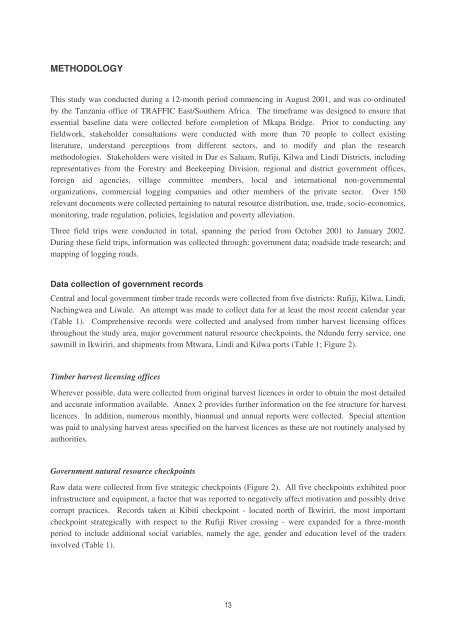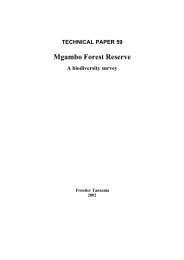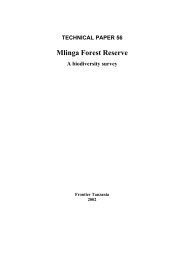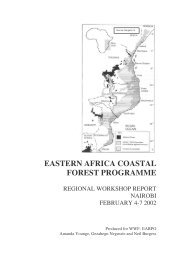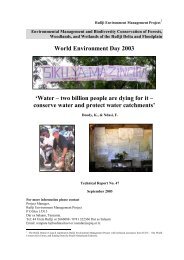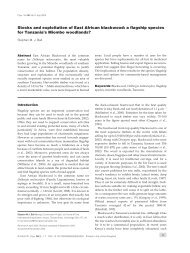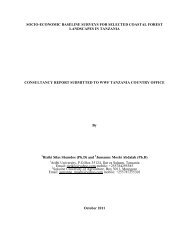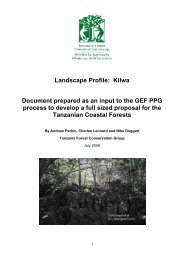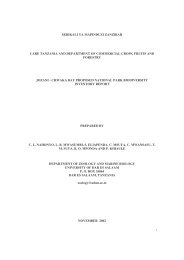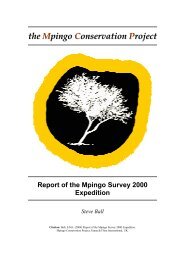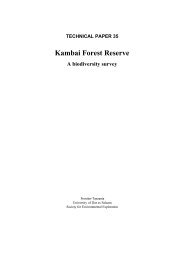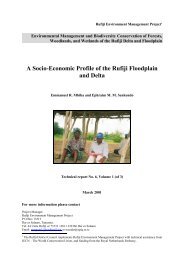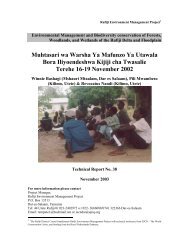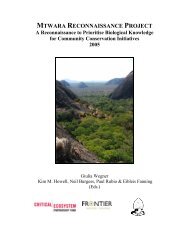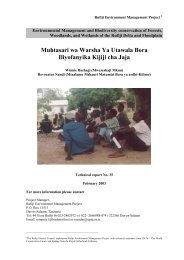Bridging the Gap: linking timber trade with infrastructural ...
Bridging the Gap: linking timber trade with infrastructural ...
Bridging the Gap: linking timber trade with infrastructural ...
Create successful ePaper yourself
Turn your PDF publications into a flip-book with our unique Google optimized e-Paper software.
METHODOLOGY<br />
This study was conducted during a 12-month period commencing in August 2001, and was co-ordinated<br />
by <strong>the</strong> Tanzania office of TRAFFIC East/Sou<strong>the</strong>rn Africa. The timeframe was designed to ensure that<br />
essential baseline data were collected before completion of Mkapa Bridge. Prior to conducting any<br />
fieldwork, stakeholder consultations were conducted <strong>with</strong> more than 70 people to collect existing<br />
literature, understand perceptions from different sectors, and to modify and plan <strong>the</strong> research<br />
methodologies. Stakeholders were visited in Dar es Salaam, Rufiji, Kilwa and Lindi Districts, including<br />
representatives from <strong>the</strong> Forestry and Beekeeping Division, regional and district government offices,<br />
foreign aid agencies, village committee members, local and international non-governmental<br />
organizations, commercial logging companies and o<strong>the</strong>r members of <strong>the</strong> private sector. Over 150<br />
relevant documents were collected pertaining to natural resource distribution, use, <strong>trade</strong>, socio-economics,<br />
monitoring, <strong>trade</strong> regulation, policies, legislation and poverty alleviation.<br />
Three field trips were conducted in total, spanning <strong>the</strong> period from October 2001 to January 2002.<br />
During <strong>the</strong>se field trips, information was collected through: government data; roadside <strong>trade</strong> research; and<br />
mapping of logging roads.<br />
Data collection of government records<br />
Central and local government <strong>timber</strong> <strong>trade</strong> records were collected from five districts: Rufiji, Kilwa, Lindi,<br />
Nachingwea and Liwale. An attempt was made to collect data for at least <strong>the</strong> most recent calendar year<br />
(Table 1). Comprehensive records were collected and analysed from <strong>timber</strong> harvest licensing offices<br />
throughout <strong>the</strong> study area, major government natural resource checkpoints, <strong>the</strong> Ndundu ferry service, one<br />
sawmill in Ikwiriri, and shipments from Mtwara, Lindi and Kilwa ports (Table 1; Figure 2).<br />
Timber harvest licensing offices<br />
Wherever possible, data were collected from original harvest licences in order to obtain <strong>the</strong> most detailed<br />
and accurate information available. Annex 2 provides fur<strong>the</strong>r information on <strong>the</strong> fee structure for harvest<br />
licences. In addition, numerous monthly, biannual and annual reports were collected. Special attention<br />
was paid to analysing harvest areas specified on <strong>the</strong> harvest licences as <strong>the</strong>se are not routinely analysed by<br />
authorities.<br />
Government natural resource checkpoints<br />
Raw data were collected from five strategic checkpoints (Figure 2). All five checkpoints exhibited poor<br />
infrastructure and equipment, a factor that was reported to negatively affect motivation and possibly drive<br />
corrupt practices. Records taken at Kibiti checkpoint - located north of Ikwiriri, <strong>the</strong> most important<br />
checkpoint strategically <strong>with</strong> respect to <strong>the</strong> Rufiji River crossing - were expanded for a three-month<br />
period to include additional social variables, namely <strong>the</strong> age, gender and education level of <strong>the</strong> <strong>trade</strong>rs<br />
involved (Table 1).<br />
13


